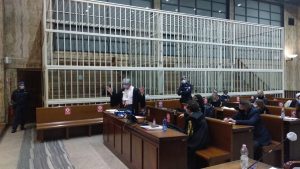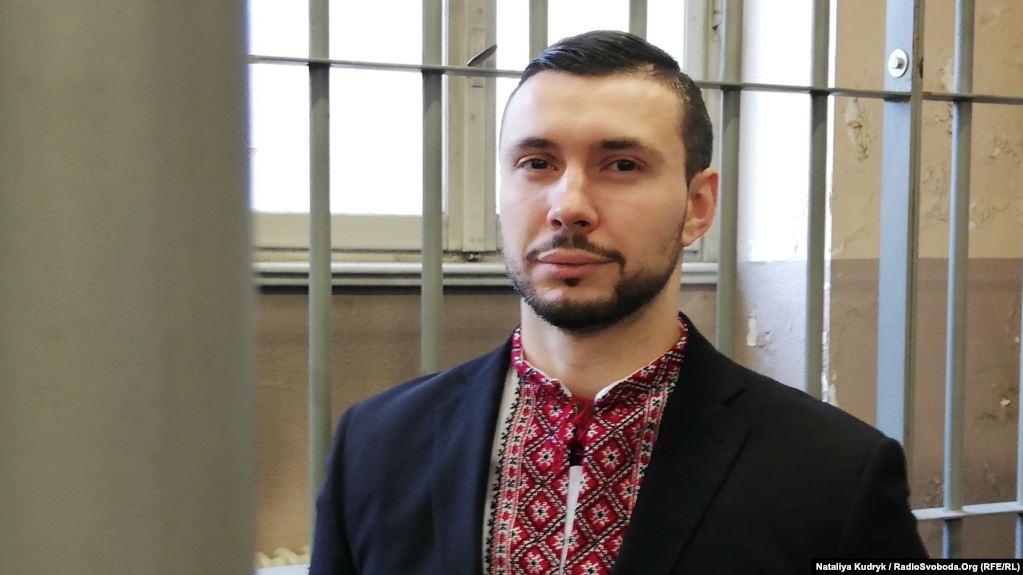National Guardsman Vitaliy Markiv, a citizen of Ukraine and Italy, who participated in the fighting in occupied Sloviansk was sentenced to 24 years by the court of first instance in Pavia, Italy for complicity in the killing of Italian photojournalist Andrea Rocchelli, Russian dissident and human rights activist Andrei Mironov, and the wounding of French photographer William Roguelon near then-occupied Sloviansk on May 24, 2014. The case is currently being heard by the Court of Appeal in Milan.
On the morning of October 23, only three journalists instead of twelve were allowed to enter the courtroom due to the rising number of Covid-19 cases in Milan. The defence teams representing accused Ukrainian soldier Vitaliy Markiv and the State of Ukraine presented their closing arguments to the court.
Niccolo Bertolini Clerici, defence lawyer for the State of Ukraine, read excerpts from reports by the OSCE and Human Right Watch, both of which had been used by the prosecutor and the lawyers representing the Rocchelli family. The reports describe the situation in then-occupied Sloviansk, Ukraine and note that in the spring of 2014 Russian-backed militants totally controlled the city, fired mortars and other projectiles into civilian neighbourhoods and occupied the local psychiatric hospital, which they then turned into their military base.
Clerici also challenged the prosecutor’s argument that the Ukrainian army was guilty of war crimes, referring once again to the numerous official reports by the OSCE and Human Rights Watch. In fact, Andrea Rocchelli himself wrote that many destructive actions against the civilian population in Sloviansk were carried out by the Russian-controlled militants.
Defence lawyer Donatella Rapetti then presented technical arguments, referring to proven facts and figures, scientific tests and logical reasoning, dismissing open and unreliable sources used by the prosecution, such as Youtube, Google maps, and questionable videos by Russian channels. Rapetti underlined that the Ukrainian Army and the National Guard of Ukraine were not “occupying” Mount Karachun, but were in fact officially on their territory as regular army units, defending the borders of their country. She also pointed out that the article in Corriere della Sera by Italian journalist Ilaria Morani, written the day after Andrea Rochelli and Andrei Mironov were killed, should not be included in the case as it was subjective and based on hearsay.

Defence lawyer Raffaele Della Valle then explained in words that everyone could understand that there was a huge problem with the prosecutor’s use of “creative” judgments.
“It should be clearly proved to all present that not only was Vitaliy Markiv on that hill, but that he was actually on duty on Mount Karachun between 17:00 and 17:08 on May 24, 2014, defending the television antenna (and not engaged in some “senseless shooting” at pro-Russian militants). The photo from an hour earlier seems to portray Markiv posing, as if he weren’t on duty at all.” remarked Della Valle.
Della Valle also pointed to many other inconsistencies and circumstantial evidence, such as the phrase allegedly voiced by Markiv in prison: “I killed (took down) an Italian reporter”.However, court-appointed experts reviewed the audio recordings and presented a totally different translation: “An Italian reporter was killed in 2014, and now they want to put the blame on me.”
Della Valle also drew attention to the open and dubious sources used by the prosecution to justify the harsh sentence (Russia Today channel), to a drawing made by a witness indicating the hill, the road and the positions, as well as to Markiv’s alleged attempt to escape from prison (the sources remain anonymous) without considering the favourable report provided by the prison director, who describes Markiv as a model prisoner, always attentive to the rules, ready to work and participate in different activities, kind and polite towards everyone.
According to Della Valle, the results of preliminary investigation documents all point in favour of the accused. It is proven that the pro-Russian militants fired at the taxi (bullets’ point of impact shows the shooting was uphill from the militants’ position and not downhill from the Ukrainian army’s position); both the pro-Russian forces, the Ukrainian National Guard and Army had the same Soviet-made weapons (Ak-74 and mortars); there is no evidence that Markiv was on duty; Markiv’s position cannot be precisely established; even if he was in the position recorded on a video shot on June 8, 2014, he could not physically see the journalists; Markiv was armed with an Ak-74, which could not hit and kill a target from that distance; there is no motive proved by the prosecution.
Furthermore, declares Raffaele Della Valle, the court of first instance in Pavia, by refusing to call this killing a war crime:
“…have scarred one soldier and the entire army of a democratic nation for life… Markiv and his comrades-in arms were in a war zone, summoned by their country; they were under specific orders, with specific tasks, but not to shoot at civilians.”
Finally, at nine o’clock in the evening, Raffaele Della Valle, a lawyer with 56 years of legal experience, summed up the day’s proceedings:
“There is no evidence and it is not a war crime, but a battle… We do not want our [legal] culture, as witnessed by all in the Pavia court, to develop to the point of rendering the defence subdued and submissive, complacent or, even worse, resigned and indifferent, because then it would be the end not only of us, but also of you.”
It is important to underline the threats and messages of intimidation that both sides have reportedly been receiving since the beginning of the appeal proceedings. Alessandra Ballerini, lawyer of the Rocchelli family, reported that she had received several threats. Threats were also addressed to Ukrainian journalist Olga Tokariuk, one of producers of the documentary Crossfire, which was previously called The Wrong Place (the name was changed to satisfy the demands of Rocchelli family members who deemed the title inappropriate and offensive). Fortunately, support and solidarity has come from European journalists’ organizations. Furthermore, as pointed out by Massimiliano Melley, journalist with Milano Today, Article 21 of the Italian Constitution sets forth that “anyone has the right to freely express their thoughts in speech, writing, or any other form of communication. The press may not be subjected to any authorization or censorship […]”.
The Milan Court of Appeal will pronounce its final decision on November 3, 2020. It will then be known whether the court has included the new evidence provided by Vitaliy Markiv’s defence team.
On October 24, Andrei Mironov’s niece Sophia Kayes posted the following message on FB:
Last Wednesday, I sent a statement to the Honourable Judge Giovanna Ada Lucia Ichino, the President of the Court of Assizes of Appeal in Milan, Italy.
I hoped that my statement would be read in Court for the jury to have a chance to hear my actual position on the investigative documentary "Crossfire - Fuoco Incrociato" (previously entitled "The Wrong Place").
I am grateful to the Honourable Judge Giovanna Ada Lucia Ichino for mentioning the receipt of my letter but I understand that unfortunately, it was not presented in Court.
I feel it's vital to make my position clear and public, so I am posting my letter in English and Italian here.
October 21, 2020
Your Honour, Giovanna Ada Lucia Ichino!
I apologise for contacting you directly but presently there is no other mechanism for me to reach out to the Court and correct an error that was made by Alessandra Ballerini in the latest hearing on 15.10.2020 on the Andrea Rocchelli’s case.
The Court and the jury should know that I renounce the statements that were read out by Ms. Ballerini in my name about the film previously entitled The Wrong Place now changed to Crossfire - Fuoco Incrociato. Ms. Ballerini never consulted me about her plans to read my outdated comments and never sought my consent to present my position on the said film in court.
New, crucial facts about the investigative documentary Crossfire have emerged since August 2020. I have changed my position and deleted my Facebook post back in August. Presently, I have agreed to cooperate with the authors of the film.
It is now clear to me, that my initial doubts about the film and the title arose from miscommunication with the authors. I based my impression of the film on personal thoughts of two filmmakers. But as our family friend and a great journalist, Anna Politkovskaya said: “What matters is the information, not what you think about it.” So, I must put aside all emotions and focus on the facts and information at hand.
The authors of the film were open and responsive to our family’s concerns. They agree that there are no “wrong places” for journalists, human rights defenders and humanitarian workers. Originally the title had a different intention, but the authors recognised that it has been misused and I am reassured by the fact that the title was changed.
Furthermore, the investigative documentary Crossfire is supported by Justice for Journalists Foundation (JFJ), London, UK. JFJ’s Board of Trustees includes such renowned investigative journalists as Luke Harding of The Guardian, Dmitry Muratov of Novaya Gazeta, an American journalist David Satter, along with other professional media experts who adhere to the highest standards of reporting.
I am convinced that this film will shed light on the investigation and provide vital additional information including which parties were shooting, from which positions, what ammunition was used and exactly what was visible from the Karachun hill.
I am incredibly disappointed by what happened in Court on 15.10.2020. Our family was unable to have a say in Court, but my voice was hijacked and misrepresented, and this is now being retranslated by some Italian journalist. Your Honour, I must object.
I trust that you will kindly read the above statement in Court on 23.10.2020 and will help my family and I to set the record straight.
Sincerely Yours,
Sophia (aka Sophie) Kayes





